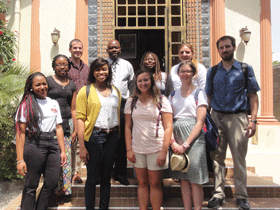(June 24, 2015)
Centenary students meet with prominent human rights lawyer
I've worked as a doctor in many places and I've seen where to be poor means to be bereft of rights.
— Paul Farmer, Co-Founder of Partners in Health.
SHREVEPORT, LA — Centenary students who participate in intercultural courses explore social constructs unique to the cultures of their destinations. This May, students who traveled to Haiti examined how a group of leaders in Haiti actively pursue social justice for their people and demand change on an island that has experienced a lifetime of inequity. With the help of Beaird Professor of Philosophy Dr. Chris Ciocchetti and Assistant Professor of Political Science Dr. Chris Parker, students will be able to respond to their new understanding of Haiti with meaningful actions to empower, and not hinder, the country's development.

Centenary College students and faculty members stand with Mario Joseph after their meeting in Haiti.
"One hot afternoon in Port-au-Prince, we met with Haiti's most prominent human rights lawyer, Mario Joseph," said Ciocchetti. "Through a translator, he told us about his projects including his work to educate rural Haitians in the Central Plateau about their legal rights."
Haiti's legal system has been plagued by corruption, long delays, and overcrowding, and weakened by large amounts of international aid circumventing the government. Many of these aid groups act aren't accountable to the Haitian people, including the United Nations.
Joseph is currently pursuing a case against the United Nations for introducing cholera into Haiti. He is also helping victims of sexual assault bring cases against their attackers, especially women and girls who were victimized while living in the tent cities after the 2010 earthquake, and he has begun a program in the countryside to educate Haitians about their rights and how to pursue them. By teaching each community how to hold their elected officials accountable, Joseph's organization hopes to create a legal environment where Haitians can thrive because their rights are respected. Joseph believes that human rights are fundamental to creating a system where Haitians receive health care, sanitation, education, and the other basics they require.
Ciocchetti explained how many Haitians receive little or no education and, as a result, do not understand how their government functions. Haitians educated in their rights will be able to enforce their rights, either through the courts or at the ballot box.
"Joseph emphasized that lasting development in Haiti requires bringing rural communities together to find solutions to their problems," said Ciocchetti. "Americans can offer political support, but Haitians must be empowered to take control of their own destiny, and that process begins with community building."
Students were moved by their time spent with this influential and controversial leader. The students kept a journal about their experiences as part of their coursework. Monroe, Louisiana native and Community Resident Assistant for Social Justice World House Dei'Anna Hall recorded her feelings about the highly rewarding encounter.
"Meeting with Mario Joseph was such an honor," wrote Hall. "Helping those who cannot afford legal counsel, advising people of their rights, and being a voice for those who often go unheard is...what Mario Joseph commits himself to daily. He risks his life to help those who are in need. People like him inspire me to become a person who looks to help, not for the sake of myself, but for others."
Students will continue making contributions to advance social justice in Haiti from the United States. The Institute for Justice and Democracy in Haiti asked for help writing for their sister organization, Speak Out for Haiti. Santé, Centenary's living and learning community dedicated to overcoming poverty and disease, chose to respond to their call. Starting this fall, the students will help write up newsletters, emails, social media posts, and blog entries to help coordinate and inform Americans interested in helping in Haiti.
"While hands-on projects in Haiti provide important support, Americans should lobby their government to adopt policies which support human rights in Haiti," said Ciocchetti. "U.S. support for a functioning legal system, for secure property rights, and a strong, capable Haitian government is necessary to overcome the problems Haiti faces."
